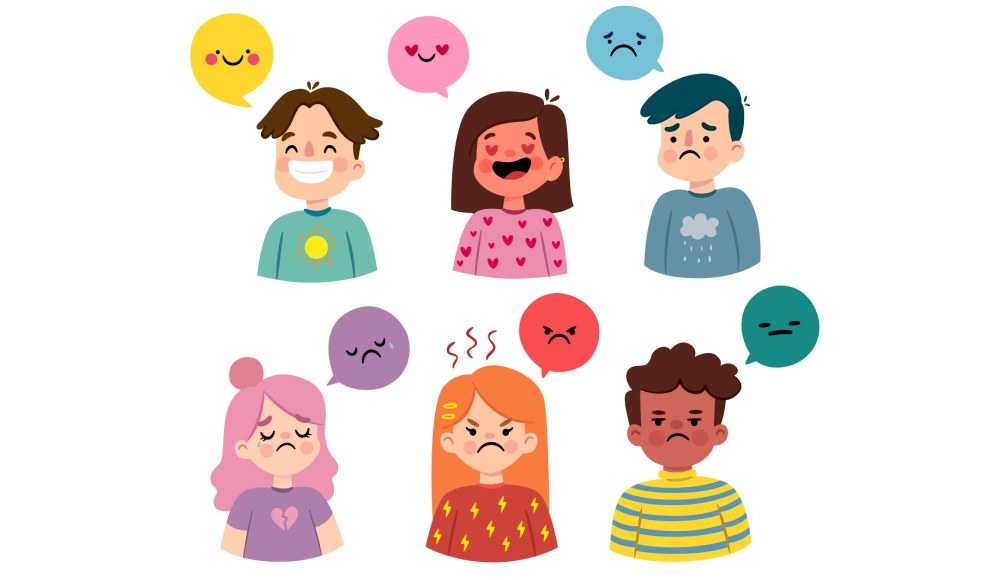Emotions play a crucial role in how one thinks and behaves. Our daily choices and behaviors are significantly influenced by emotions that arise from various life events. In psychology, emotions are complex reactions involving subjective experiences, physiological responses, and behavioral expressions. According to APA, emotions are conscious mental reactions (such as anger or fear) subjectively experienced as strong feelings usually directed toward a specific object and typically accompanied by physiological and behavioral changes in the body.
Also Read: What is emotional regulation
Understanding emotions is crucial because it significantly affects mental health, decision-making, and behavior. Emotions are connected to cognitive processes, including perception, attention, memory, and learning. For example, when someone feels fear, their body and mind react to protect them, which is critical for survival. On the other hand, emotions like love and affection can strengthen social bonds and enhance personal connections. This understanding also plays a role in recognizing one’s own emotional state which is essential for personal growth, navigating social situations, forming meaningful relations, and developing healthier coping mechanisms.
Emotional Well-being
Emotional well-being refers to the ability to manage emotions healthily, fostering resilience, contentment, and balance in life (Park, et al, 2022). Maintaining this emotional well-being is essential for overall mental health, as unresolved or suppressed emotions can be one of the reasons for stress, anxiety, and depression.
Benefits of Emotional Well-being
- Improved Mental Health – Emotional well-being promotes and enhances positive mental health by reducing stress, anxiety, and depression
- Enhanced Relationships – People with good emotional well-being are better equipped to form and maintain healthy relationships. There is more effective communication and empathy towards others.
- Higher life Satisfaction – Individuals who maintain emotional well-being tend to experience greater satisfaction in life, as they are more in tune with their needs, desires, and feelings (Schutte, et al., 2002)
How to cultivate emotional well-being
- Mindfulness and Self-awareness – Practicing mindfulness helps individuals become more aware of their emotions and better understand how they influence thoughts and behaviors.
- Developing Emotional Intelligence—Emotional intelligence involves recognizing and managing one’s emotions and understanding others’ emotions. This can improve personal and professional interactions.
- Maintaining a support system – Building a strong support system with friends and family provides much-needed emotional support and can improve well-being
- Healthy Lifestyle choices – These play a significant role in supporting not only physical but also maintain healthy mental and emotional stability.
- Seeking Professional help – At times when we struggle with regulating our emotions to an extent where it is disturbing our daily routine, it is a good idea and to go and seek professional help. Counselling or therapies can provide effective tools and strategies to regain emotional balance and well-being.
Positive Emotions
Positive emotions are not just “happy feelings” that we chase to feeling momentary pleasure. They are the ones that contribute to a sense of happiness, satisfaction, and well being. These emotions can uplift individuals, improve their psychological state and enhance resilience against life’s challenges. Joy. Gratitude, Serenity, Hope, Love, amusement are a few positive emotions. These emotions in general help build stronger relationships, enhance motivation and contribute to overall life satisfaction. Positive emotions are markers of people’s overall wellbeing or happiness, but they also enhance future growth and success(Cohn & Fredrickson, 2009).
The Broaden and Build Theory of positive emotions (Fredrickson B.L .,2001) suggests that specific positive feelings—like joy, interest, contentment, pride, and love—each have their own unique qualities but share a common ability to expand how we think and act in the moment. These emotions encourage us to explore new ideas, take positive actions, and be open to experiences. Over time, this helps us develop lasting resources, such as physical strength, knowledge, social connections, and emotional resilience, which support us in facing challenges and improving overall well-being.(Fredrickson, 2001)
Conclusion
Emotions shape our experiences, influence our behavior, and contribute to our overall physiological well being. Positive emotions enhance mental health and also improve social connections and personal satisfaction. Understanding the importance of emotions and cultivating emotional well-being can lead to more fulfilling, resilient, and balanced lives.
References
Cohn, M. A., & Fredrickson, B. L. (2009). Positive emotions. In S. J. Lopez & C. R. Snyder (Eds.), Oxford handbook of positive psychology (2nd ed., pp. 13–24). Oxford University Press.
Fredrickson, B. L. (2001). The Role of Positive Emotions in Positive Psychology: The Broaden-and-Build Theory of Positive Emotions. The American Psychologist, 56(3), 218. https://doi.org/10.1037//0003-066x.56.3.218
Park, C. L., Kubzansky, L. D., Chafouleas, S. M., Davidson, R. J., Keltner, D., Parsafar, P., Conwell, Y., Martin, M. Y., Hanmer, J., & Wang, K. H. (2022). Emotional Well-Being: What It Is and Why It Matters. Affective Science. https://doi.org/10.1007/s42761-022-00163-0
Schutte N. S., Malouff, J.M., Simunek M., Hollander, s., McKenley, J., (2002). Characteristic Emotional Intelligence and Emotional Well-Being. School of Psychology, University of New England, Armidale, NSW, 2351

